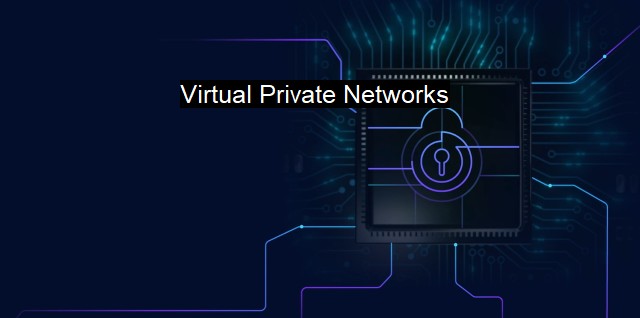What are Virtual Private Networks?
The Vital Role of Virtual Private Networks (VPNs) in Ensuring Cybersecurity: Features, Benefits and Usage
A Virtual Private Network, commonly known as a VPN, is a technology that offers a secure connection over a public or private network, such as the internet, providing users a practical approach to conduct their online activities, bypassing surveillance, espionage, and data restraints. The term “Virtual” denotes software-defined, while “Private” means a closed communication path, and “Network” represents multiple devices linked to share data and resources. VPNs play an integral role by shaping an encrypted tunnel within a network, thus safeguarding the sensitive information of the connected devices from unauthorized access and risks associated with compromised security.At its core, a VPN works via a process called tunneling. This process encapsulates the user’s data packets within another data packet and transmits it over the public network. This encapsulation method essentially conceals information about the original data, like its source IP, destination IP, or data payload.
Developing an understanding of VPN protocols is crucial when addressing cybersecurity. Several protocols, including Point-To-Point Tunneling Protocol (PPTP), Layer Two Tunneling Protocol (L2TP), OpenVPN, Secure Socket Tunneling Protocol (SSTP), and Internet Key Exchange version 2 (IKEv2), are necessary for the functionality of VPNs. These protocols ensure the integrity of your data by offering distinct levels of security and functioning manner.
In light of increasing security threats prevailing on the internet, VPNs help conceal your online identity internet service providers (ISPs) or any intruders on the internet. Without a VPN,, an individual's browsing activity and personal information would be readily accessible to hackers with appropriate techniques. In this sense, VPN becomes an effective component of a comprehensive cybersecurity system, providing data privacy and security.
On public Wi-Fi networks, users are particularly susceptible to malicious attacks. Scenarios like these demonstrate how essential the encryption VPNs offer is, providing individual users with privacy and anonymity. This confidentiality consequently reduces the probability of identity theft and any potential invasion associated with public networks.
VPNs can work synergistically with renowned antivirus software. After preliminary checks from security software (antivirus), VPNs add a second layer of security enhancing cybersecurity, creating an obstacle for unauthorized access. This collaboration can keep potentially hazardous sites and downloads at bay while maintaining maximum internet speeds.
Regardless of location, VPNs enable users to circumvent geo-blocked or region-limited content. Miscreants often use this capability to their advantage to perform nefarious activities; therefore, cybersecurity protocols should account for such operations and continue to enhance the security levels.
Corporate environments often implement site-to-site VPNs to link their office branches across varied locations. Firewall and intrusion prevention systems are standard security measures within VPN networks in these environments to add protection against security risks.
Despite misunderstandings and miscommunication, cybersecurity ecosystems are not complete without VPNs. They provide advantages that traverse not only access to unlimited data over a secured line but also intranet resources, potential risk mitigation co-functioning with antivirus protocols and software.
VPNs are an essential component of cybersecurity and antivirus capabilities. They provide user privacy, data protection, and increased anonymity on the internet while mitigating several potential threats. A VPN allows security implementations to deal aptly with both passive and active cyber threats, extending a superior control level over data transmission in corporate and personal spaces. Combined with robust antivirus software, VPNs help maintain an atmosphere of safety and trust in the evolving digital world.

Virtual Private Networks FAQs
What is a virtual private network (VPN)?
A virtual private network (VPN) is a technology that creates a secure and encrypted connection between two devices over the internet. It allows users to connect to a private network remotely, enabling them to transfer data securely and privately.How does a VPN enhance cybersecurity and antivirus protection?
A VPN enhances cybersecurity and antivirus protection by encrypting internet traffic, making it difficult for hackers to intercept or steal data. It also hides the user's IP address, making it difficult for cybercriminals to track their online activity. Therefore, when using a VPN, users can browse the internet with peace of mind, knowing that their online activities are secure and private.Are there any risks associated with using a VPN?
While VPNs provide enhanced cybersecurity, there are some risks associated with using them. Some free VPN providers may log and sell users' data, while others may contain malware or spyware. Therefore, it is essential to choose a reputable VPN provider that has robust security and encryption features.What are the different types of VPN protocols?
There are several types of VPN protocols available, including Point-to-Point Tunneling Protocol (PPTP), Layer 2 Tunneling Protocol (L2TP), Internet Protocol Security (IPSec), and Secure Socket Tunneling Protocol (SSTP). Each protocol has its strengths and weaknesses, so it's important to choose a protocol that meets your specific needs.| | A | | | B | | | C | | | D | | | E | | | F | | | G | | | H | | | I | | | J | | | K | | | L | | | M | |
| | N | | | O | | | P | | | Q | | | R | | | S | | | T | | | U | | | V | | | W | | | X | | | Y | | | Z | |
| | 1 | | | 2 | | | 3 | | | 4 | | | 7 | | | 8 | | |||||||